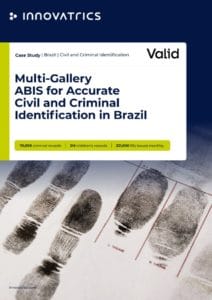Brazil’s complex and diverse landscape made it legal for individuals to hold multiple identification documents, with each of its 27 states issuing their own IDs and driver’s licenses. Moreover, each state had its own database, and often with outdated biometric systems, which could be prone to issues such as ID fraud. Maranhão, Espírito Santo, and Piauí were among the states struggling with these challenges.
States in Brazil either relied on outdated biometric solutions, or in some cases, still used paper documentation. This slowed down the identification process and made it difficult to prevent the occurrence of fraud. The biometric tools being used before were obsolete and often inaccurate. Innovatrics, alongside its local partner Valid, was brought in to look for a solution that would replace existing biometric technologies and introduce modern tools for securely collecting and identifying biometric data.
and ensure consistency
for more accurate identification
Innovatrics, alongside its local partner Valid, implemented a multi-gallery ABIS for civil and criminal use cases. It has a deduplication feature, which identifies and removes duplicate records, and enables the migration of legacy records. This made it easier to ensure that the same individual could not possess multiple fraudulent IDs. Moreover, Innovatrics developed a custom fingerprint algorithm to tackle the issue of child trafficking.
To improve the accuracy of criminal identification, multiple biometric modalities such as fingerprints, palmprints and facial recognition for both 1:1 and 1:N matching were implemented. ABIS also includes a latent fingerprint editor and case management tools to streamline criminal investigations. A separate gallery was thus created for criminal purposes, enabling officers to group evidence into specific cases and be more organized.
for criminal investigations
to find and remove duplicate records and fraud attempts
The implementation of Innovatrics ABIS has transformed civil and criminal identification processes across multiple states in Brazil. The states now have a unified biometric system that helps prevent fraud, streamlines the issuance of IDs, and improves the speed and accuracy of criminal investigations. In doing so, they can synchronize their records on a national level in the future.
The custom solution for registering children’s fingerprints has further strengthened Brazil’s efforts to combat child trafficking. The new algorithm is designed to accurately scale the smaller fingerprints of children, making identification reliable and fast. The criminal investigation tools have enhanced law enforcement’s ability to solve crimes quickly and effectively. Furthermore, officers can import scanned cards and photos, which serve as valuable resources for investigating cases more efficiently.
using a unified biometric system
IDs issued monthly
with a custom algorithm for registering their fingerprints
“Innovatrics ABIS is a fantastic tool and has shown excellent results. We use the tool for the biometric enrolment in issuing civil ID documents, for criminal identification and for the processing of fingerprint and faces collected at sites related to criminal offences. “DirectorJuarez CarvalhoForensic Biometric Institute of the Scientific Police of State of Piauí
Law enforcement officers can customize the case management features based on the local legal framework of their criminal investigation process such as information about evidence upload, metadata, personal characteristics, history of performed biometric identifications for each fingerprint or face, and stored information about a hit for each identified biometric evidence. Innovatrics ABIS can help define and reveal connections between unresolved cases and newly collected evidence.
Innovatrics Civil and Criminal ABIS offers fast, reliable, and scalable biometric identification for civil registrations and analysis for criminal investigations. The introduction of modern biometric tools, including the latent fingerprint editor and case management features, has streamlined crime-solving across states.
Since children’s fingerprints are smaller and their ridges grow apart as they grow, standard fingerprint analysis often leads to errors. Developing a custom fingerprint algorithm for children’s identification highlights the flexibility and innovation of the system. It ensures their accurate registration, which can protect them from child trafficking.


We’ll get back to you within 24 hours.